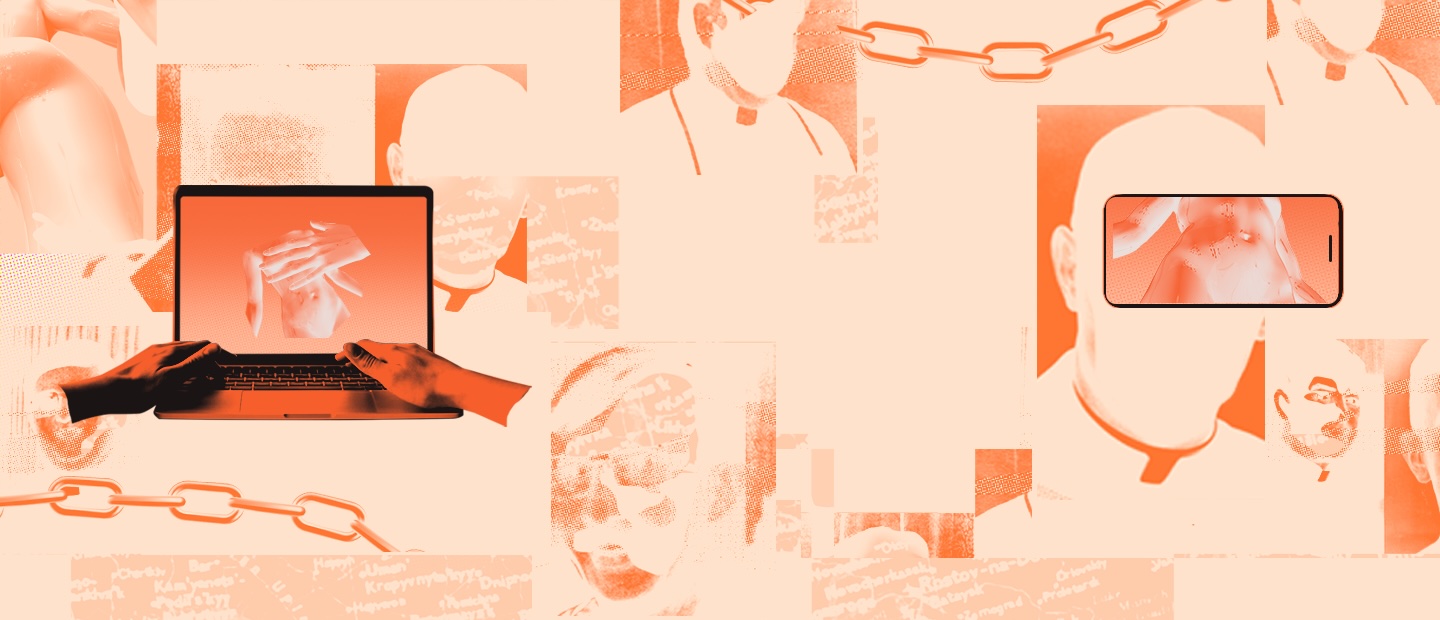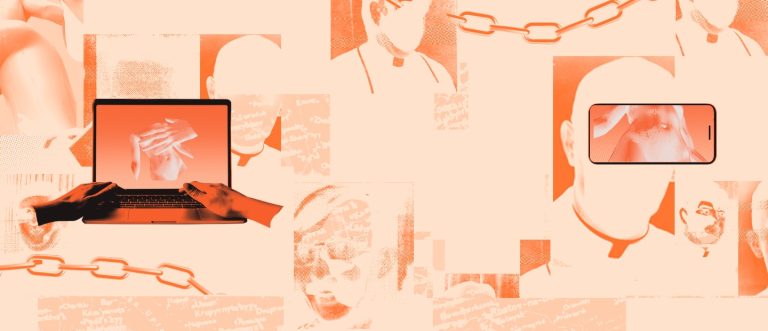Illustration: Aleksandra Ołdak 2024-03-04
Illustration: Aleksandra Ołdak 2024-03-04
A priest convicted in Lithuania of possessing child pornography has been quietly transferred to Olsztyn, Poland. He is working as a chaplain at a Catholic association.
Though church authorities say he “has been punished,” the priest continues to lead retreats and has contact with children. FRONTSTORY.PL brings this case to light in cooperation with Lithuanian outlet Redakcija.
On a frosty January morning, a group of children sled down a railroad embankment. They were in the vicinity of the Olsztyn-Redykajny railway stop. Right next door to the station is a small building where Father Sławomir B., chaplain of the Catholic Consolata Association, has spent the past several years officiating.
Up until 2018, the Polish priest Sławomir B. worked as a vicar and pastor in parishes in Lithuania. He was transferred to Olsztyn after a Lithuanian court decided to fine him for possessing 33 files of child pornography. The priest pleaded guilty in court.
The Olsztyn curia—an official, administrative body of the Catholic Church—was aware of the case. In Poland, the Church conducted a canonical proceeding in the priest’s case. In such a proceeding, a church court examines whether a clergyman has committed a crime and whether he possibly deserves expulsion from the priestly state. Only while the proceedings were ongoing was Sławomir B. prohibited from working with children and young people. The proceedings have been completed, and the priest has been punished, the curia says, although it does not want to reveal what the punishment was. After the investigation, the ban on working with children was lifted, and the priest returned to a normal job.
Everything took place quietly. When the case went to court, preparations for Pope Francis’s visit were underway in Lithuania. An affair involving a Polish parish priest would have been a serious burden for the Church.
The story of Father Sławomir B. is one of several uncovered by the investigative work of Lithuanian outlet Redakcija. In the course of their investigation, Redakcija journalists uncovered crimes committed by people in the Catholic Church over the past 20 years against children, seniors, and the mentally handicapped. These include financial crimes, possession of child pornography, and sexual abuse of children.
That a priest would be transferred as punishment for pedophilia isn’t new: In February 2023 we wrote about two Polish clergymen punished for similar crimes in Denmark—and who were quietly transferred to work in Poland.
Repentance, fine, quick obliteration
In February 2018, the Lithuanian prosecutor’s office was investigating the distribution of child pornography via the network eDonkey, used for peer-to-peer file sharing (like Napster, which was famous in the early 2000s). The prosecutor’s office suspected that the files may also have been sent from a computer belonging to Father B., the parish priest in Išlaužas, a village a hundred kilometers from the Polish-Lithuanian border.
They first questioned the priest as a witness. Sławomir B. claimed that he did not download or store pedophilia on his computer. But in his apartment, prosecutors found two laptops, CDs, an external drive and a cell phone. They found 20 files of child pornography on one of the computers, 12 on the disk, and one on the phone—a total of 33 files of child pornography.
Sławomir B. was questioned again, this time as a suspect. He admitted that he downloaded the files using the eMule program, which works in the same way as eDonkey. The files ended up on his computer’s drive along with many thousands of others, because the priest likes to browse pornography. If he downloaded files involving a child, he deleted them after viewing, he claimed.
An analysis by the Lithuanian prosecutor’s office shows that the priest’s materials included people under the age of 15—and that this material was so-called hard pornography. The priest assured investigators that he did not distribute the files to other web users. However, this does not mean that no one else viewed them. The eMule program works in such a way that one user’s files can be viewed and downloaded by any other user.
The priest pleaded guilty, expressed remorse, and paid a fine: 5,000 euros. The Lithuanian court’s decision was erased from the public record after three years.
Crime and quiet punishment
Father B.—tall, powerfully built, over 40 years old—agreed to a meeting. He led the way to a guest room, the headquarters of the Konsolot association, where he is the chaplain. At first he answered questions, then withdrew. A few days later, we received an email from his lawyer, who wrote that the priest does not agree to give his name. The lawyer threatened us with legal action.
Six years after the scandal in Lithuania, the priest now admits that he downloaded pornography from the Internet. However, he claims that he was not aware of downloading material involving children. He easily lists the names of the sites he used and remembers the titles of the videos. He wonders aloud: based on the appearance of an actress in a pornographic film, can you determine how old she is, and that she is definitely over fifteen? He claims that when he noticed scenes involving children he removed them from the media, because pedophilia “is not his genre.”
Six years after the investigation, the priest claims: Everyone in the parish knew the password to his computer, which was used by anyone who wanted access. Who? The priest knows who was able to download the videos and photos, but he won’t disclose this, because he is bound by secrecy. “I was offered to surrender voluntarily to punishment,” he says. “That if I take the issue upon myself I will be punished with probation or some kind of fine. The matter will be settled without publicity.”
We check: pornography files were found not only on his computer (the one used by everyone), but also on an external drive and a phone. How did this happen? The priest doesn’t know.
In his testimony before the Lithuanian prosecutor’s office, Father B. did not say anything about whether the files could have been downloaded by someone else. And he didn’t talk about the alleged secrecy at the time, either.
All has been said
The priest returned to Poland, where he was included in the canonical proceedings. It’s a complicated process. First, the relevant diocese (in the case of a diocesan priest) or province (in the case of a religious priest) is supposed to launch a preliminary investigation to determine the likelihood of a crime. A relevant delegate for the protection of children and adolescents conducts the investigation. This is the person who has been empowered to notify law enforcement authorities. The party under investigation is supposed to be barred from performing church functions for the duration of the investigation.
Once it is determined that it is probable a crime was committed, the Vatican’s Dicastery for the Doctrine of the Faith (formerly the Congregation for the Doctrine of the Faith) is supposed to receive documentation of the preliminary investigation. From that point on, any further decisions regarding the determination or lifting of the statute of limitations and the canonical process are made by the Vatican, which orders the proceedings before the bishops’ court. It can issue a verdict of expulsion from the clerical state, but such a verdict must be approved by the Holy See.
In the case of Priest B., was the crime substantiated? Did the clergyman inform his superiors that the files found in his apartment were not only on a private computer but also on an external drive and a phone? Did he hide behind “secrecy” during his explanations? What does the curia think about the fact that the association, in which Sławomir B. is a chaplain, organizes tours, camps and summer vacations? Why was the priest directed to work in an association where he may have contact with minors?
The Olsztyn curia answered our dozen questions in only one paragraph. The curia learned about Sławomir B.’s case from a phone call with the priest himself in August 2018: “Immediately the steps that canon law provides in such cases were taken, and on the same day the Congregation for the Doctrine of the Faith was informed of the case. The priest was punished by the ecclesiastical justice system.”
When asked about the nature and extent of the punishment, a curia spokesman responded: “Everything that needed to be said in this case has already been said. For details, please ask the one involved in the case.”
Priest feels fatherhood when around children
Sławomir B. is from Frombork. He graduated from the seminary in Olsztyn, and was ordained in 2006. He ended up as a curate at a parish in Bisztynek. In an article from his time there, he talked about leading an oasis, and spoke of how much he enjoys young people and children, “such little ones, toddlers, like the ones from our parish schools.” “It is somehow also a satisfaction, some feeling of fatherhood,” he explained. “The fact that I won’t be a father physically, but I can be a father spiritually.”
In Lithuania, he worked in two parishes in the diocese of Vilkaviškis [lt. Vilkaviškis]. He was vicar in Marijampolė beginning in 2011, and parish priest in the village of Išlaužas starting in 2016. In addition, he sat on the Council of the Youth Center operating under the diocese of Vilkaviškis. His picture is still on the Center’s website.
In Lithuania, the priest was a frequent guest of the elementary school in Išlaužas, and participated in Catholic Youth Days. In Lithuanian media, photographs of him in the company of children can also be found.
After returning from Lithuania, he quickly got back to work. He was assigned to the role of chaplain in the Konsolota association. The organization brings together adults. Its governing body is secular. Although Sławomir B. asserted that he does not work with children, the association’s charter reads that its purpose is to organize not only retreats, days of recollection, lectures, but also excursions, camps, and vacations.
Father B. continues to participate in services and retreats. In 2022, he led a retreat for the youth of the Light-Life Movement. On his Facebook profile, we found photos of him in the company of children. After our conversation with the priest, the photos disappeared.
Members of the Konsolata association do not know for what reason Father B. was transferred from Lithuania to Poland. The association’s chairman, Miroslaw Niedzwiecki, says he has a poor memory and does not recall how Father B. explained his reasons for returning to Poland. The chairman quickly cut off our conversation.
One of the people involved in Konsolata’s activities admitted to us anonymously that the official reason for the chaplain’s return was never given—although the priest meets with members of the organization every day.
This article was originally published in Polish on frontstory.pl
Subscribe to Goulash, our original VSquare newsletter that delivers the best investigative journalism from Central Europe straight to your inbox!
An investigative journalist at FRONTSTORY.PL, Mariusz Sepioło previously published reports and interviews in Tygodnik Powszechny and Polityka, among other publications. He is the author of several non-fiction books: Clerics, Himalayan Women, People and Reptiles, and Nationalists.







